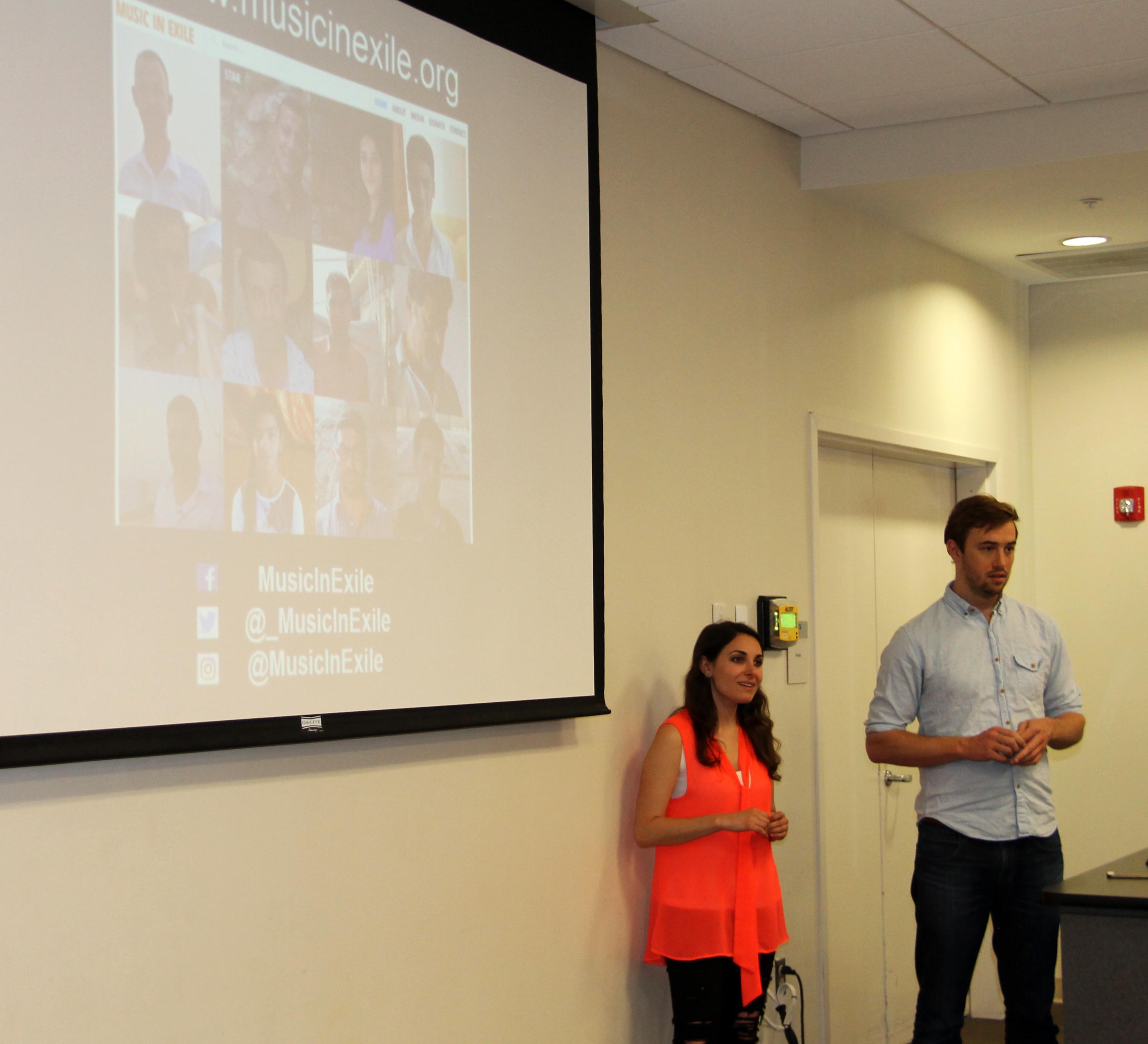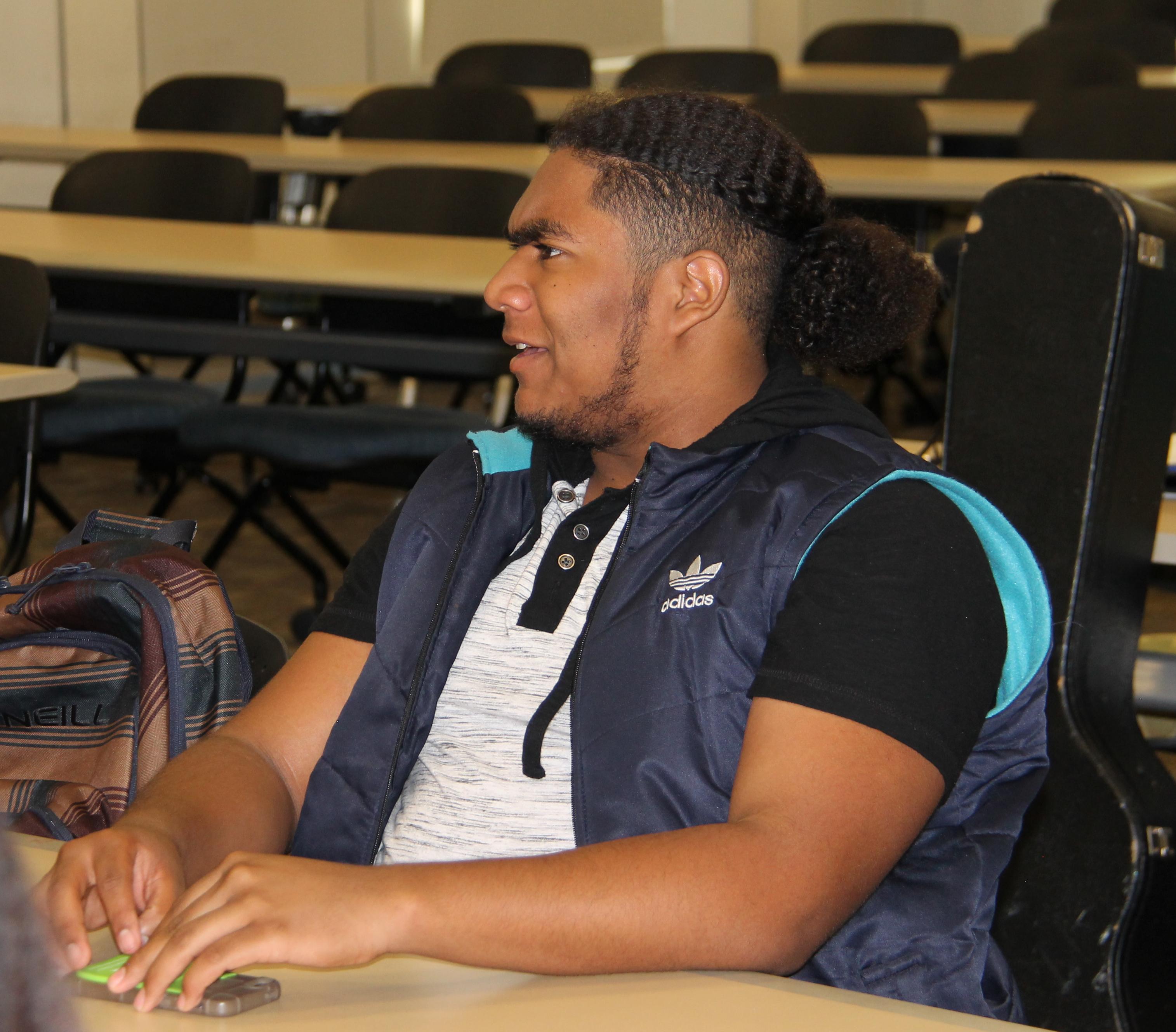May 15, 2017

‘Music In Exile’ gives students insight into plight of refugees

By: Nicol Tinsley
VCU Global Education Office
(804) 828-6463
nctinsley@vcu.edu
RICHMOND, Va. (May 15, 2017) — Sasha Ingber and Alex Ebsary, co-founders of the D.C.-based non-profit organization Music in Exile, have a passion for telling the stories of talented musicians who are refugees due to wartime. The two recently spoke to a class of VCU Globe students about how the project’s mission to bring the tragic accounts of refugees to the rest of the world can bring about knowledge, empathy and understanding.
The organization’s mission is “to record people displaced by sectarian violence in war to document their songs and their stories,” said Ingber. It has specific goals to document large-scale displacement through music and stories, to preserve intangible cultural heritage, to empower people who are displaced and to humanize people who are reduced to statistics.
Telling the stories
When Ingber and Ebsary created the organization, the idea came from two different motivations. “When we started thinking about this project, for my side it was about thinking about recording music and for Sasha’s side, it was about trying to figure out how you tell the stories,” said Ebsary. “We came up with the idea to have a website where you can listen to music and read short stories about people’s lives,” said Ebsary.
As a multimedia journalist, Ingber’s professional training helps her find answers to the many questions that arise about refugees. “I have a background in storytelling; I’m a journalist. So for me, beyond preserving people’s musical traditions, it’s the stories of what they left behind, how they fled, what life would be like for them in the future,” she said.
The presentation to students provided a detailed overview about the start of the organization, their journey and the reasons they saw a need for this project. Ingber relayed her personal connection to the students. Her grandfather, a survivor of the Holocaust who had aspirations of becoming an opera singer, was denied his dreams due to Anti-Semitism. His aspirations were further thwarted after being placed in a concentration camp during Hitler’s reign. He was known to sing as he headed to and while was in the concentration camp.
Ingber disclosed how survivors subsequently contacted her grandfather after World War II ended to let him know how much his singing had meant to them. “His singing gave them hope and comfort that everything would be okay,” she said. This gave Ingber an understanding of the effects war has on those living through it, causing her to see the need for this project. “I saw how people have citizenship, rights, everything taken away and have to start a new life elsewhere,” she said.
Ebsary was inspired by his interaction with a man he met in 2011 while visiting a refugee camp in Iraq. The Syrian musician was playing a saz, a Middle Eastern stringed instrument, that had only a few strings left on it. Hearing the man play, Ebsary was enthralled by his music and said, "Wow, your music is so beautiful!” The man’s poignant response, “Well, if I had all of my strings I would make you cry,” resonated so much with Ebsary, it caused him to consider exploring on a greater scale.
“That really stuck with me, and I started thinking about how to bring the talents that people in refugee camps have − these amazing cultures that are being destroyed through displacement − to the greater world?” he said.
After considering the project goals, Music in Exile was born.
First destination: Kurdistan, Iraq
Ingber shared how the two started the organization, citing that since the crisis in Iraq and Syria was being deemed the worst humanitarian crisis since World War II, the organization began their focus on the Middle East.
“We started the project in August of last year, and raised money from our family and friends to travel to Kurdistan to refugee camps and to meet people off camp as well, and we prepared to record their music and interview them,” said Ebsary.
Ingber and Ebsary’s first trip occurred in October, 2016, as they traveled to the Kurdistan region of northern Iraq for two weeks. They recounted details of the two-day trip to Kurdistan, sharing that the first day of their arrival coincided with the operation to liberate Mosul. They relayed the experience of flying into Iraq and witnessing a black line of smoke directly over Mosul above the clouds, allowing for a topical inclusion of current events in the presentation. Students heard about the various refugee camps of Kurdistan, as they provided detailed descriptions of the camps and the inhabitants, including religious affiliations, languages and customs.
The main portion of the talk centered on the 30 talented musicians the two had interviewed. Students listened to some of the musicians’ recorded music, along with the lyrics, poems and prose captured. Ingber and Ebsary showed videos that provided the essence of the musicians’ personal stories and shared an overview of each person’s life. The poignant story of Dilan, a visually impaired 14-year-old boy, was told as his music played. Ingber relayed how important his music is as he stated: "I have nothing but music."

The presentation concluded with a robust question and answer session, allowing the students to learn even more about the process, the customs, food and the duo’s experiences.
“This is definitely something that I never really considered before,” said Zachary Greene, a freshman majoring in biology and biochemistry. “I guess really one of the best ways to reach out to people is to touch them through music. People give aid, and like to give money, but I guess one real thing you can give a person is music. And that’s a powerful thing. I really do respect what’s happening here.”
Impactful outcome
Both Ingber and Ebsary were impacted by many facets of the project, and have a passionate desire to impart to others what they have learned.
“With all that material, their music and learning about their lives we hope to educate people about who refugees are,” said Ingber. “Often in mainstream media, people don’t think about the human side. They hear about the 65 million displaced people in the world; they hear about the 1.8 million in Kurdistan, but each person has a story, each person has a song, each person has something unique to offer.”
Music in Exile is continuing to meet and record the poignant music and stories of refugees, as well as share their experiences with others across campuses and organizations. The organization is planning a visit to Jordan next fall.